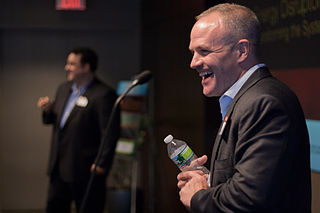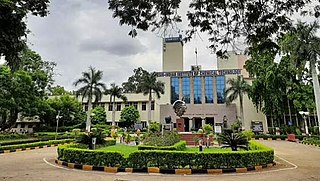
Jay D. Keasling is a professor of chemical engineering and bioengineering at the University of California, Berkeley. He is also associate laboratory director for biosciences at the Lawrence Berkeley National Laboratory and chief executive officer of the Joint BioEnergy Institute. He is considered one of the foremost authorities in synthetic biology, especially in the field of metabolic engineering.

Jonathan S. Dordick is an institute professor of chemical and biological engineering at Rensselaer Polytechnic Institute and holds joint appointments in the departments of biomedical engineering and biological sciences. In 2008 he became director of the Center for Biotechnology and Interdisciplinary Studies. In 2012 Dordick became the vice president for research at RPI. He became Special Advisor to the RPI President for Strategic Initiatives in 2018,

Alla Venkata Rama Rao is an Indian inventor and chemist, known for his pioneering researches in the field of drug technology. He is the founder of the A. V. Rama Rao Research Foundation, a non governmental organization promoting research and doctoral studies in chemistry and Avra Laboratories, an organization dealing in intermediates and active pharmaceutical ingredients, used in therapeutics. An elected fellow of the Indian National Science Academy, Indian Academy of Sciences, National Academy of Sciences, India, and Third World Academy of Sciences (TWAS), Rama Rao is a recipient of several awards such as TWAS Technology Award, VASVIK Industrial Research Award and Om Prakash Bhasin Award. The Government of India awarded him Padma Shri in 1991 and Padma Bhushan in 2016.
Laxmangudi Krishnamurthy Doraiswamy (1927–2012) was an Indian-American chemical engineer, author and academic, known for his contributions in developing Organic synthesis engineering as a modern science discipline. Chemical Engineering journal of McGraw Hill listed him among the 10 most distinguished chemical engineers in the world in 1988. He was the author of nine texts in chemical engineering, including Organic Synthesis Engineering, a 2001 publication which is known to have introduced the topic as a definitive scientific stream and Heterogeneous reactions: Analysis, Examples, and Reactor Design, reportedly the first comprehensive text in chemical engineering.
Suvendra Nath Bhattacharyya is an Indian molecular biologist, epigeneticist and the principal scientist at the Indian Institute of Chemical Biology of the Council of Scientific and Industrial Research. He is a recipient of the Swarnajayanthi Fellowship of the Department of Science and Technology and the National Bioscience Award of the Department of Biotechnology. The Council of Scientific and Industrial Research, the apex agency of the Government of India for scientific research, awarded him the Shanti Swarup Bhatnagar Prize for Science and Technology, one of the highest Indian science awards, in 2016, for his contributions to biological sciences.
Adusumilli Srikrishna (1955–2013) was an Indian organic chemist and a professor at the department of organic chemistry at the Indian Institute of Science. He was known for his researches on radical cyclisation and natural products synthesis. He was an elected fellow of the Indian National Science Academy, National Academy of Sciences, India and the Indian Academy of Sciences. The Council of Scientific and Industrial Research, the apex agency of the Government of India for scientific research, awarded him the Shanti Swarup Bhatnagar Prize for Science and Technology, one of the highest Indian science awards, in 1997, for his contributions to chemical sciences.
Ganesh Prasad Pandey is an Indian organic chemist and scientist at the National Chemical Laboratory. He is known for his research on photo-induced single electron transfer reactions and the synthesis of natural products. He is an elected fellow of the Indian National Science Academy the National Academy of Sciences, India and the Indian Academy of Sciences. The Council of Scientific and Industrial Research, the apex agency of the Government of India for scientific research, awarded him the Shanti Swarup Bhatnagar Prize for Science and Technology, one of the highest Indian science awards, in 1999, for his contributions to chemical sciences.

Santanu Bhattacharya is an Indian chemical biologist and former professor at the Indian Institute of Science. At, present he is the Director of the Indian Institute of Science Education and Research, Tirupati (IISER-Tirupati). He is known for his studies of unnatural amino acids, oligopeptides, designed and natural lipids and biologically active natural products and is an elected fellow of the Indian National Science Academy The World Academy of Sciences and the Indian Academy of Sciences The Council of Scientific and Industrial Research, the apex agency of the Government of India for scientific research, awarded him the Shanti Swarup Bhatnagar Prize for Science and Technology, one of the highest Indian science awards, in 2003, for his contributions to chemical sciences. He is also a recipient of the National Bioscience Award for Career Development of the Department of Biotechnology (2002) and the TWAS Prize (2010).
Gangadhar J. Sanjayan is an Indian bioorganic chemist, scientist and the head of The Sanjayan Lab at the National Chemical Laboratory, Pune. He is known for his researches on the synthesis of designer peptide/protein mimetics and hetero-foldamers and is a recipient of the Bronze Medal of the Chemical Research Society of India. The Council of Scientific and Industrial Research, the apex agency of the Government of India for scientific research, awarded him the Shanti Swarup Bhatnagar Prize for Science and Technology, one of the highest Indian science awards, in 2012, for his contributions to chemical sciences.

Dumbala Srinivasa Reddy is currently Director CSIR-IICT Indian Institute of Chemical Technology Hyderabad India, he has additional charge of CSIR-IIIM CSIR-Institute of Integrative Medicine at Jammu and CSIR-CDRI CSIR-Drug Research Institute at Lucknow, India.
Bhaskar Dattatraya Kulkarni, popularly known as B. D. among his friends and colleagues, was an Indian chemical reaction engineer and a Distinguished Scientist of Chemical Engineering and Process Development at the National Chemical Laboratory, Pune. An INSA Senior Scientist and a J. C. Bose fellow, he was known for his work on fluidized bed reactors and chemical reactors. He is an elected fellow of the Indian Academy of Sciences, Indian National Science Academy, The World Academy of Sciences and the Indian National Academy of Engineering. The Council of Scientific and Industrial Research, the apex agency of the Government of India for scientific research, awarded him the Shanti Swarup Bhatnagar Prize for Science and Technology, one of the highest Indian science awards for his contributions to Engineering Sciences in 1988.
Javed Naim Agrewala is an Indian immunologist, the prof. at Indian Institute of Technology Ropar and the chief scientist and professor at the Institute of Microbial Technology, Chandigarh. Known for his research on Tuberculosis, Agrewala is an elected fellow of all the three major Indian science academies viz. National Academy of Sciences, India, Indian National Science Academy and Indian Academy of Sciences. The Council of Scientific and Industrial Research, the apex agency of the Government of India for scientific research, awarded him the Shanti Swarup Bhatnagar Prize for Science and Technology, one of the highest Indian science awards for his contributions to Medical Sciences in 2005. He is also a recipient of the National Bioscience Award for Career Development of the Department of Biotechnology.
Anand Kumar Bachhawat is an Indian geneticist, biochemist, professor in biological sciences and the dean of faculty at the Indian Institute of Science Education and Research, Mohali. Known for his studies on microbial genetics, Bachhawat is an elected fellow of all the three major Indian science academies namely Indian Academy of Sciences, National Academy of Sciences, India and Indian National Science Academy.
Pradip Kumar Chakraborti is an Indian molecular biologist, biochemist was the Chief scientist at Institute of Microbial Technology (IMTECH), a constituent institution of the Council of Scientific and Industrial Research and presently a Professor in the Department of Biotechnology at School of Chemical and Life Sciences in Jamia Hamdard, New Delhi. Known for his studies on Prokaryotic signal transduction, Chakraborti is an elected fellow of all three Science Academies in India the National Academy of Sciences, India, Indian Academy of Sciences and the Indian National Science Academy. His studies have been documented by way of a number of articles and ResearchGate, an online repository of scientific articles, has listed 98 of them. Besides, he has also contributed chapters to books edited by others. The Department of Biotechnology of the Government of India awarded him the National Bioscience Award for Career Development, one of the highest Indian science awards, for his contributions to biosciences in 2001.
Mohammad Islam Khan (1957–2010) was an Indian glycobiologist and a scientist at the National Chemical Laboratory. Known for his studies on the biology of Lectins, Khan was an elected fellow of the National Academy of Sciences, India, Maharashtra Academy of Sciences and the Muslim Association for the Advancement of Science. The Department of Biotechnology of the Government of India awarded him the National Bioscience Award for Career Development, one of the highest Indian science awards, for his contributions to biosciences in 2002.
Sunil Kumar Manna is an Indian immunologist and the head of the immunology lab of the Centre for DNA Fingerprinting and Diagnostics. He is known for his studies on cell signaling and apoptosis. The Department of Biotechnology of the Government of India awarded him the National Bioscience Award for Career Development, one of the highest Indian science awards, for his contributions to biosciences, in 2009.
Chandrasekharan Kesavadas is an Indian radiologist and a professor of radiology at the Sree Chitra Tirunal Institute for Medical Sciences and Technology. His research focus in the fields of magnetic resonance imaging, neuroradiology medical imaging informatics and brain Computer interface. He led a team of scientists who developed an imaging protocol for scanning intractable epilepsy, a computational software for detecting cortical dysplasia and novel neuroimaging systems for weighted imaging of brain cancer. His studies have been documented by way of a number of articles and ResearchGate, an online repository of scientific articles has listed 275 of them. The Department of Biotechnology of the Government of India awarded him the National Bioscience Award for Career Development, one of the highest Indian science awards, for his contributions to biosciences, in 2009. The award orations delivered by him include the 2010 edition of the M. N. Sen Oration of the Indian Council of Medical Research.
Alok Krishna Sinha is an Indian molecular biologist, biochemist, plant physiologist and a staff scientist Grade VII at the National Institute of Plant Genome Research (NIPGR). Known for his research on Mitogen-activated protein kinase (MAPK) cascade in plants, he is a three-time Alexander von Humboldt Fellow and an elected fellow of the National Academy of Sciences, India. The Department of Biotechnology of the Government of India awarded him the National Bioscience Award for Career Development, one of the highest Indian science awards, for his contributions to biosciences, in 2013.
Amol Arvindrao Kulkarni is an Indian research scientist at National Chemical Laboratory, Pune. He earned his PhD from the Institute of Chemical Technology, Mumbai in chemical engineering. His research expertise includes design and development of microreactors.
T Govindaraju is a professor in the Bioorganic Chemistry Laboratory at Jawaharlal Nehru Centre for Advanced Scientific Research, Bengaluru. The researchers in the Bioorganic Chemistry Laboratory work in areas which lie at the intersection of chemistry, biology and biomaterials science, and in particular, on problems related to Alzheimer's disease, peptide chemistry, molecular probes, molecular architectonics, nanoarchitectonics and biomimetics.





